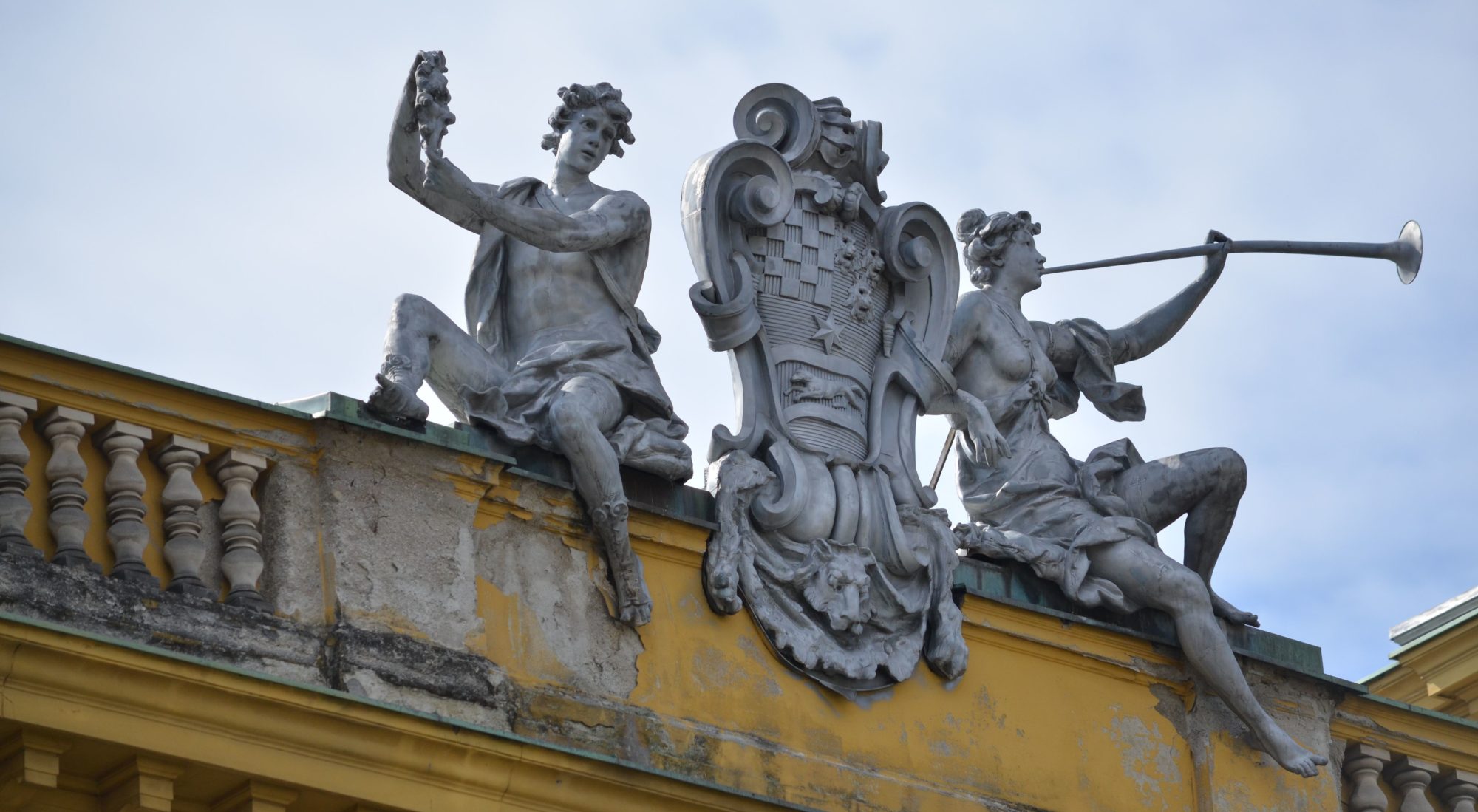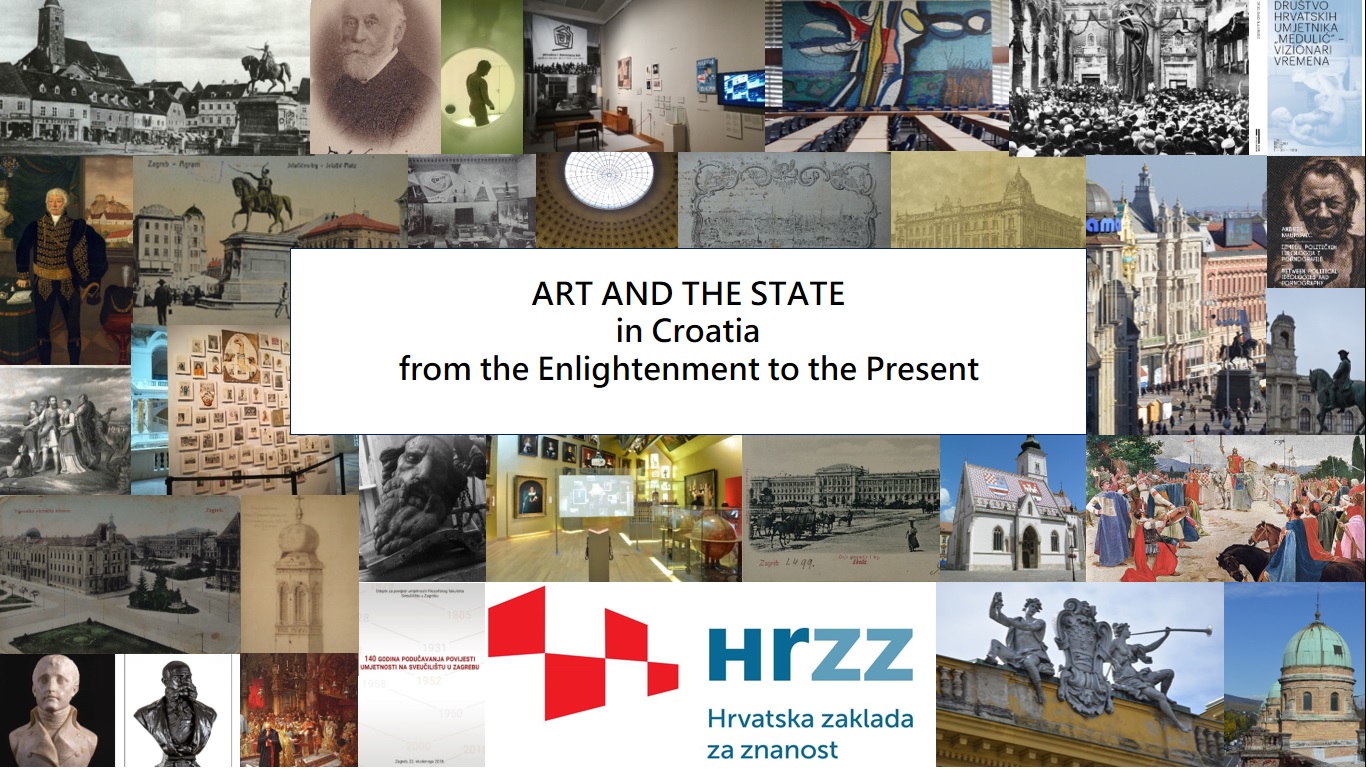Poziv: Javno predstavljanje rezultata prvoga i plana drugoga izvještajnog razdoblja projekta „Umjetnost i država u Hrvatskoj od prosvjetiteljstva do danas“/„Art and the State in Croatia from the Enlightenment to the Present“ (HRZZ-IP-2018-01-9364) koji financira Hrvatska zaklada za znanost održat će se u četvrtak, 30. 1. 2020., s početkom u 12.00h u prostoriji A-126 na Filozofskom fakultetu u Zagrebu. Projekt će predstaviti voditelj prof. dr. sc. Dragan Damjanović.
CFP: Art and the State in Modern Central Europe (18th – 21st Century)
CFP: Art and the State in Modern Central Europe (18th – 21st Century)
Faculty of Humanities and Social Sciences, University of Zagreb
Zagreb, Croatia, 2-5 September 2020
Deadline: 15 January 2020
https://art-state.ffzg.unizg.hr/
Attempts to explore and define in more detail, both diachronically and synchronically, relationships and mutual influences between state bodies and art production, communication, education and reception have for decades formed an important part of numerous explorations in various academic disciplines such as art history, history, anthropology, sociology, education etc. The conference aims to provide insights into the current knowledge and interpretations of these relations from the 18th century to the present day, i.e. from the period in which Europe states went through intense centralization, leading to the growth of their influence on artistic production, public cultural and artistic institutions and education. In all these contexts the term “state” is taken to stand for a politically organized body of people usually occupying a definite territory and the political organization of such a body of people (Merriam Webster Dictionary).
Regardless of whether they were monarchies, republics, federations or centralized states, state bodies played an extremely important role in the production of art and in the institutionalization of knowledge, culture and art in all parts of Europe and throughout the aforementioned period. By fabricating its visual identity, commissioning works from artists whom it considered close, and censoring those segments of art production that it judged potentially dangerous to its survival, the state has largely been shaping the art scene in all parts of Europe. Additionally, states’ cultural and educational policies have influenced (and still does) the shaping of knowledge about the arts and teaching content in the field of art (history) on all educational levels.
The conference therefore welcomes contributions that deal with approaches to interpretation of these phenomena and various topics in the broad field of art history (painting, sculpture, applied arts, graphic design, photography, architecture, urban planning, curricula and study programmes in art history, etc.) but also other humanities disciplines.
The contributions could address the following topics:
- Representation, propaganda, image-making in European states
- Art and changes of state borders
- Art commissioning policies
- Control of art production through censorship
- State-sponsored artists
- State-funded education of artists
- Public sculpture and the state
- Public space furnishing campaigns
- Preservation of architectural heritage
- Formal and informal education and promotion of artistic and cultural literacy
- State policies and the acquisition of artworks for public museums and other institutions
- Architecture and state authorities
- Interstate artistic projects
- Art and war
- Art in totalitarian and democratic regimes
- Artists as social critics
- Church and public officials as art commissioners
- Institutionalization of knowledge, culture and arts
- Cultural and educational policies, national identity and visual arts
- State Policy and Strategies of Designing Everyday Life
- Art market, illegal trade and counterfeit art
As a topic that can provide almost limitless possibilities for reviewing, expanding and deepening current understandings, other issues concerning the complex relations between art and the state can also be touched upon within the given topics.
The Art and State in Modern Central Europe international conference will take place at the Faculty of Humanities and Social Sciences, University of Zagreb, from 2 to 5 September 2020. It will be organized within the project “Art and the State in Croatia from the Enlightenment to the Present”, IP-2018-01-9364, funded by the Croatian Sciences Foundation.
SUBMISSION GUIDELINES:
Paper proposals should contain author(s)’s name(s), title and the body of text, written in English, which should not exceed 400 words and a short author’s biography not longer than 250 words.
Proposals should be sent to art-state@ffzg.hr
Deadline for the submission of proposals is 15 January 2020.
Contributors will receive notification of acceptance by 5 February 2020.
The official language of the conference is English.
About the project
The project Art and the State in Croatia from the Enlightenment to the Present aims to explore influences of the state regime on art production and interpretation of artworks and artistic heritage. Since the Croatian cultural and political space in the period from the late 18th ct. to 1991 formed part of different states (Austro-Hungarian Empire, Independent State of Croatia, Yugoslavia, Republic of Croatia), the project researchers will attempt to show the degree and nature of the impact the state-based bodies exerted on artistic production and cultural and educational policies. Croatian art will therefore be contextualised with artistic developments in the neighbouring countries or the areas of political association with Croatia, due to which the implementation of the project entails numerous field researches (urban space, museums, libraries, archives). In terms of its goals, the project is divided into two major groups of activities – research on the impact of the state on different areas of artistic production through commissions, grants and censorship, and the impacts on the process of artistic heritage production and care and on formal and informal education in the field of visual arts. In addition to the principal investigator the project includes 14 researchers (2 doctoral students and 6 postdoctoral researchers) to whom this project is of great importance for the development of their academic careers. By engaging researchers from heritage institutions (museums and conservation departments), the project contributes to the promotion of interinstitutional cooperation and ensures multidimensional views on intricate relationships between art and the state. Project results will be published in journals, books, proceedings, catalogues and the like, as well as through exhibitions and conferences. The team plans to organize two project-related scientific conferences and a workshop.

